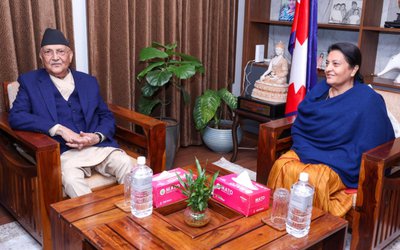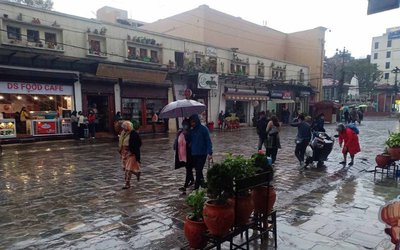
This column was begun almost three years ago, in the face of Loktantra’s triumphalism and mainstream corporate media’s censoring hegemony, as much a feeble attempt to speak uncomfortable truth to power as to place on record what the new political masters of New Nepal wished to airbrush away from the pages of history. It talked about their shady ethics, myopic vision and external tutelage as well as the unstable foundations of their directionless “new politics”. It described how the sanctity of an elected body like the constituent assembly had been systematically debased from the very first day by the oligarchic conduct of major party leaders. It predicted how, for these reasons the CA would be unable to frame a new let alone a workable constitution.
Readers may feel that the chance to crow – “I told you so!” – might be providing me psychological satisfaction, but strangely it does not. The reason is I feel like a passenger who has been screaming at the driver not to take a wrong turn towards a ditch who, when he does find himself stuck in a bus in that ditch with all other passengers of New Nepal, has too many other pressing problems at hand to waste time or emotion gloating.
The other reason is that some of my well-meaning readers are saying I should stop writing this column. Their not-to-be-taken-lightly argument is that the civil society stalwarts who midwifed Loktantra are themselves now beginning to say what I had been saying these last three years, and sometimes in much more vitriolic language against the current big party oligarchs, their rudderless leadership and their foreign sponsorship! There is nothing more I can say about how feckless the Loktantrick political class has been than that which its own civil society supporters are now beginning to say in print and on FM stations.
From this column on, I will look hard and try to write about things other than political pathology, but before that, some reflections on why this about-face from our street-dancing civil society masters.
Civic movements are fueled not by tamasik coercive power that is the preserve of the state, nor by rajasik persuasive power of market players. They receive their energy from the satwik power of the moral high ground. Once that ground is lost, all is lost. And the civil society of 2005/2006 lost it in two different ways. First, they dedicated their satwik shield to the service of corrupt politicians and mass murderers who brought the democracy of 1990 to grief, those same leaders who have brought the succeeding “wave of democracy” of 2006 to grief too, not just by repeating the same corruption on a grander scale and disregarding any semblance of the rule of law but additionally by blatantly kowtowing to foreign tutelage. Our civil society opinion makers have not shown the moral courage to apologize for their misplaced poor judgment in handing over the reins of the country to those who should have been behind bars in the first place. The reason the people of Nepal refuse to follow them today as they did in the Spring of 2006 is because, without exhibiting some moral spine and the courage to admit mistakes, they will not have regained the moral high ground from where their pontificating would be taken seriously.
The second manner in which the civil society has lost its ethical persuasiveness is with its emerging exposure as conduits and major beneficiary of foreign funding for influencing the already corrupt political class within and outside the CA. They may have accepted that largesse in all goodwill, but, as they say, the road to hell is paved with good intentions. And the country today is certainly in political limbo if not yet in outright hell for which the civil society of 2006 has to take moral responsibility. Certainly, the public is not taking those fire-and-brimstone speech givers of Spring 2006 seriously today since they are perceived as being part of the problem together with the failed political class. It may be that, given how ineffective they have been in guiding the CA to a safe landing and preventing its failing so ignominiously, their foreign sponsors have lost faith in them. That, many say, is the reason some of them have begun speaking in almost xenophobic language these days against foreign intervention. That, the apathetic public seems to feel, is nothing more than the wrath of the jilted lover that will probably die down in sullen depression in the days ahead.
But let’s move on to more cheerful things. The fulminations of the civil society stalwarts against the Khilraj interregnum notwithstanding, the country is relatively peaceful, basic services are running along at C-plus to B-minus, sometimes even A-plus, and an octogenarian Japanese can still come to Nepal and climb Mt. Everest. Despite the failure of the political class to provide leadership, the “just get along” Nepali genius seems to assert itself where it really matters – the passport section of the foreign ministry. Why this is so is because this is after all a country that managed to hold by itself a first-time-ever national referendum in just one day in 1980, and wrote a constitution for a completely new governance framework in one month in 1961, a constitution that ran for three decades despite attempts to distort and sabotage it from the right, left and abroad in that period. Why do I give that section of the foreign ministry such high marks?
Last week I had to apply for a new MRP passport, my two-year old MRP having run out of pages. I was dreading having to go through the red tape at the CDO office and face the anarchy at the west gate of the Narayanhiti palace to submit my form in person. The amazing streamlining that seems to have occurred in these two years is something that can be exported to any California Department of Motor Vehicles office that gives driving licenses. The process of filling out the passport application form, getting it verified against one’s citizenship certificate and all other signatures in four different rooms at the Lalitpur CDO office took exactly twenty three minutes. I had to use no ‘source-force’ whatsoever and in three of the rooms they did not even recognize me as a former minister: the same alacrity in service was democratically available to me as to a semi-literate grandmother preparing to visit her new-born grandson in Australia. When I thanked the officers there for this remarkable service, they proudly told me, “If nowhere else in Nepal, at least here we have managed to deliver the fruits of Loktantra to the people!”
The story was similar in Narayanhiti. Two years ago, I had to use “source-force” and the good services of a former student who was then in charge of the passport section, even to get past the urine-puddled front gate. This time, my driver stood in line early in the morning for me, called me when the gates were opened, and I found myself number 196 in a very orderly queue with some four hundred people still behind me. In front of me was a young bhai from Rukum on his way to Abu Dhabi and behind me another from Sindhuli heading for Malaysia. They could have gotten their passports in forty-five days in their districts for only five thousand rupees, but they were here paying double to get it in seven days. To my question why, they said it made economic sense because they could get all their medical and manpower formalities done while waiting a week for their passport. Those in a hurry could get it in forty-eight hours by paying fifteen thousand rupees. I was done with the queue in just about three hours, time which I spent reviewing an article for a journal seated fairly comfortably under a green covered canopy with electric fans in what used to be the car park for ministers and visitors who had to go and see the King. The toilet inside that serviced this mass of Nepali humanity had running water and none of the ammonia one gets at the TIA.
Nepali society it seems knows that the remittance sector is upholding the economy, and is asserting itself to protect and service what really matters. If only its political class had not failed it so badly, there is no doubt it could have worked wonders with the country’s development.

Dipak Gyawali
Gyawali is Pragya (Academician) of the Nepal Academy of Science and Technology (NAST) and former minister of water resources.
- Re-Thinking Democracy: Why South Asians Are worried
- Mar 17, 2025
- Nepal’s Governance Mired In Endemic Corruption
- Feb 20, 2025
- What Might The Age Of Trump Look Like?
- Jan 22, 2025
- Kathmandu Dialogue With Dugin
- Dec 25, 2024
- Bioregionalism Satsang
- Sep 27, 2024














